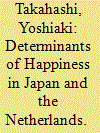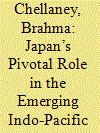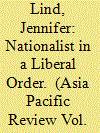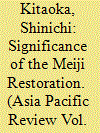|
|
|
Sort Order |
|
|
|
Items / Page
|
|
|
|
|
|
|
| Srl | Item |
| 1 |
ID:
160967


|
|
|
|
|
| Summary/Abstract |
As part of the institutional reform plan of the State Council approved by the 13th National People’s Congress, a new aid agency, China International Development Cooperation Agency was inaugurated in April 2018. As the first such agency in the country's history, its establishment will bring about a major change in the implementation structure of China’s foreign aid. It is important to follow and understand how China will improve and increase its foreign aid. This article reviews the current status of China’s foreign aid: forms and implementation structure, aid policies, volume of aid, and future challenges.
|
|
|
|
|
|
|
|
|
|
|
|
|
|
|
|
| 2 |
ID:
160970


|
|
|
|
|
| Summary/Abstract |
It is often said that the Japanese happiness is lower than that of Europeans. However, sufficient discussion has yet to take place with consideration of differences in social forms as a background factor. In this study, therefore, by leveraging comparative international surveys, we empirically study and compare the factors that affect happiness in Japan and in the Netherlands, a country which has a higher happiness level than other European countries, from both macro (country level) and micro (individual level) perspectives.
|
|
|
|
|
|
|
|
|
|
|
|
|
|
|
|
| 3 |
ID:
160963


|
|
|
|
|
| Summary/Abstract |
The imperative in the Indo-Pacific region is to build a new strategic equilibrium pivoted on a stable balance of power. A constellation of likeminded states linked by interlocking strategic cooperation has become critical to help build such equilibrium. Japanese Prime Minister Shinzo Abe is the author of the “free and open Indo-Pacific” concept that the US is now pushing. But Japan faces important strategic challenges. To secure itself against dangers that did not exist when its current national-security policies and laws were framed, Japan must bolster its security or risk coming under siege. US security interests will be better served by a more confident and secure Japan that assumes greater responsibility for its own defense and for regional security. The US must encourage Japan, which has not fired a single shot against an outside party since World War II, to undertake greater national-security reforms. Peace in Asia demands a proactive Japan.
|
|
|
|
|
|
|
|
|
|
|
|
|
|
|
|
| 4 |
ID:
160966


|
|
|
|
|
| Summary/Abstract |
This article aims to analyze why negotiations for the Japan-China Treaty of Peace and Friendship were extended for a longer period than expected. Treaty negotiations were protracted largely due to a backlash against the Normalization of Sino-Japanese relations in 1972. Moreover Japan’s diplomacy against China was entwined with political factional strife in the Liberal Democratic Party. Premier Takeo Fukuda’s diplomatic guidance was solid and steady. He created an agreement within the party over time by rejecting an early political settlement that Premier Kakuei Tanaka did in 1972. He also addressed the territorial issue calmly, and steadily advanced negotiations for the treaty. As a result, the Fukuda administration successfully achieved the Japan-China Treaty. Conclusion of the Treaty by Fukuda, who had strong ties with the pro-Taiwan camp, brought an end to the conflict over policy towards China within the LDP.
|
|
|
|
|
|
|
|
|
|
|
|
|
|
|
|
| 5 |
ID:
160960


|
|
|
|
|
| Summary/Abstract |
The Institute for International Policy Studies (IIPS), an independent, non-profit research institute founded in 1998 by former prime minister of Japan Yasuhiro Nakasone, has pursued an ambitious research program that covers the fields of international politics, economics, security, energy, and the environment for 30 years. The Institute also convenes international symposia and seminars on important political and economic issues and conducts joint projects with other research institutes in Japan and internationally. Research findings and policy proposals are published in print and on the website.
|
|
|
|
|
|
|
|
|
|
|
|
|
|
|
|
| 6 |
ID:
160965


|
|
|
|
|
| Summary/Abstract |
In the past few years, many wealthy democracies have exhibited significant backlash against the liberal international order. Why has Japan—also a leader of this order—remained comparatively calm? I argue that though Japan was a prominent member of the liberal international order, in many ways it pursued policies far less liberal than those of its partners. Japanese trade policies (lingering trade barriers in in agriculture and non-tariff barriers in industrial sector) protected different sectors of the Japanese economy. Where Japan did liberalize, the government upheld the social compact of extending benefits to dislocated workers. Furthermore, Japan’s strict immigration policy contrasts with far more welcoming immigration policies in Europe and the United States. Tokyo deferred to public skepticism about immigration (rather than disregarding it, as did American and European leaders). The more nationalist agenda of a leading liberal state is critical for understanding both the roots of the current crisis in the liberal international order—and how it might be saved.
|
|
|
|
|
|
|
|
|
|
|
|
|
|
|
|
| 7 |
ID:
160962


|
|
|
|
|
| Summary/Abstract |
The Nakasone Yasuhiro Peace Institute (formerly Institute for International Policy Studies) marks its 30th anniversary this year in June 2018. The three decades that the Institute has existed coincide almost perfectly with the length of the Heisei period, as the fact that this is Heisei year 30 indicates. Therefore, in the present article, “Heisei economy” will be the term used in this review of developments in the Japanese economy over the past three decades.
|
|
|
|
|
|
|
|
|
|
|
|
|
|
|
|
| 8 |
ID:
160961


|
|
|
|
|
| Summary/Abstract |
The year 2018 marks the end of the 260-year rule by the Tokugawa Shogunate and the start of a new government headed by the Emperor. The term “Meiji Restoration” is often used narrowly to refer to the political events of 1868, which is why the 150th anniversary is observed this year. More generally, however, the term often refers to the series of changes that occurred after the new government was established, including Japan’s opening to the world, abolition of feudal domains and the samurai class, establishment of the modern Cabinet system in 1885, and proclamation of the Meiji Constitution in 1889 and the opening of the Parliament in 1890. In this article, the author uses the term in this broader sense.
|
|
|
|
|
|
|
|
|
|
|
|
|
|
|
|
| 9 |
ID:
160968


|
|
|
|
|
| Summary/Abstract |
The year 2018 marks the 150th anniversary of the establishment of diplomatic relations between Japan and Sweden. It is believed that the first contact between Sweden and Japan came during the Edo Period and was mediated by the Netherlands. The Treaty of Friendship, Commerce and Navigation between Japan and Sweden, signed in 1868, also came into being thanks to the good offices of the Dutch. This treaty, like many others into which Japan entered at that time, was an “unequal treaty.” As Japan increased its presence in East Asia, this unequal treaty with Sweden was revised in 1911. The world was changing. Sweden and Japan shared a common interest in opposing Russia’s ambitions. Russia in particular was a common threat to the diplomatic posture and security of both Japan and Sweden. These two nations, positioned like bookends on either side of Russia, could be important strategic partners for one another and allies in their relationships with Russia. Considering the current issue of North Korea, Sweden also has the potential to act as a mediator because it maintains diplomatic relations with North Korea. There is reason to believe that the diplomatic relationship between Japan and Sweden will develop further.
|
|
|
|
|
|
|
|
|
|
|
|
|
|
|
|
|
|
|
|
|